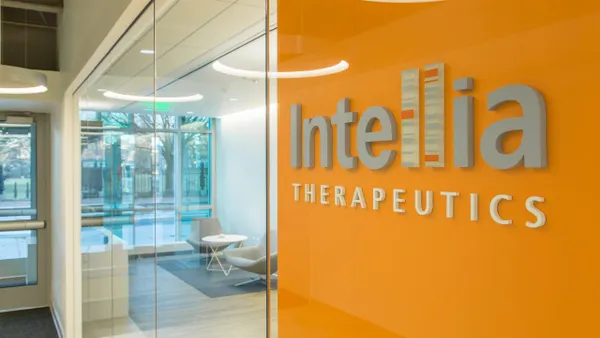For the first time in more than two decades, a completely new form of antipsychotic medication will be available in the U.S. following an approval Thursday by the Food and Drug Administration.
While momentous, the approval may also put a renewed spotlight on an enduring defect of the American healthcare system. An effective medicine is coming to market, but patients may have a hard time getting it at first because of insurance barriers. Analysts on Wall Street are optimistic there won't be many such hurdles, but some psychiatry specialists are cautious, citing past experience with new drugs.
The medicine, which will be sold as Cobenfy, was developed by Boston-based biotechnology company Karuna Therapeutics. In three medium- to large-sized clinical trials, Karuna showed that treatment with Cobenfy significantly relieved schizophrenia symptoms in people with the mental disorder.
Not only that, the drug didn’t cause excessive weight gain, restlessness or movement issues — side effects that are common to existing antipsychotics and, historically, have led patients to either switch medications or stop taking them altogether.
The results have been met with excitement, especially since substantial portions of the schizophrenia population don’t respond to or stay on other therapies. Yet doctors, while eager to have another treatment option, say they aren’t sure how much Cobenfy will ultimately benefit patients.
One main concern is to what extent insurance providers will cover such a drug, given the abundance of cheaper alternatives. The FDA has already approved more than a dozen antipsychotics for schizophrenia, and many have inexpensive generic versions that patients may be encouraged to try first. Cobenfy, meanwhile, carries a list price of $22,500 for a year’s supply, before accounting for insurer rebates or discounts.
A Bristol Myers spokesperson said the company priced the drug “in line with the landscape of branded oral antipsychotics.” Most patients, the spokesperson added, won’t pay the list price.
“You really have to be sure it’s better than everything else out there that’s cheaper and more readily available,” Mitzi Gonzales, a neuropsychologist and director of translational research at Cedars-Sinai, said in an interview earlier this year.
Carol Lim, a psychiatrist at Massachusetts General Hospital, noted in an interview this year how, after approval of the schizophrenia drug Caplyta in 2019, it was hard to get insurance coverage until after other treatments failed.
Cobenfy’s rollout will be handled by Bristol Myers Squibb, which recently acquired Karuna for $14 billion. Bristol Myers’ Chief Commercial Officer, Adam Lenkowsky, said on an earnings call in late July that payers have given “very positive feedback” to the company and acknowledged Cobenfy “fills a significant unmet need.”
Lenkowsky added that a team at Bristol Myers has, for months, been pitching Cobenfy to state Medicaid directors and Medicare payers. Estimates hold that more than 80% of schizophrenia patients are on those programs, meaning buy-in from them will be “critical,” according to Lenkowsky.
Citing data from Clarivate, Bristol Myers estimates the U.S. schizophrenia population totals around 1.6 million.
Cobenfy’s labeling includes warnings of risks that include urinary retention, increased heart rate and swelling of the face and lips. The FDA advises against using the drug in people with moderate to severe kidney impairment, or with known liver impairment.

On Wall Street, expectations for Cobenfy are high. The investment firm Cantor Fitzgerald envisions annual sales reaching $1 billion starting in 2026. More broadly, analysts have predicted the drug will generate north of $3 billion by 2030, according to Leerink Partners.
“I think you’re going to get a massive bolus of early adopters,” Paul Matteis, an analyst at Stifel who previously covered Karuna, said late last year. “And I think Bristol [Myers] just has to not mess it up.”
Sales could rise higher if Cobenfy notches additional approvals, a goal Bristol Myers is already working toward. A roughly 400-person study is evaluating the drug as an add-on therapy for schizophrenia patients who aren’t adequately responding to their current atypical antipsychotics. Data from that experiment should come next year.
Also in 2025, Bristol Myers plans to push the drug into late-stage testing for both bipolar disorder and the agitation that often accompanies Alzheimer’s disease.
Then, in 2026, the company anticipates results from two trials of some 800 people with psychosis tied to Alzheimer’s.
Cobenfy isn’t like available antipsychotics, all of which work by balancing levels of the chemical messengers dopamine or serotonin. It instead activates “muscarinic receptors,” a type of protein researchers believe harmonizes certain brain circuits that aren’t properly functioning in schizophrenia and some other psychiatric conditions.
Boosted by Karuna’s results, muscarinic receptors have become a hot commodity. Just two weeks before Bristol Myers announced its acquisition plans, AbbVie agreed to buy Cerevel Therapeutics for almost $9 billion.
A Pfizer spinout, Cerevel has been developing a muscarinic drug, emraclidine, that could ultimately rival Cobenfy. A pair of emraclidine studies, which, together, have enrolled around 750 participants with schizophrenia, should produce initial data before the end of the year.
Further behind, companies like Neurocrine Biosciences, Neumora Therapeutics and MapLight Therapeutics are working on their own muscarinic agents.
Editor’s note: This story has been updated with pricing information from Bristol Myers.















